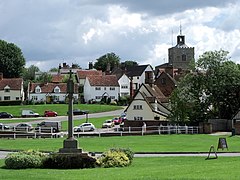Finchingfield
| Finchingfield | |
|---|---|
 Finchingfield village green | |
Location within Essex | |
| Population | 1,471 (2011)[1] |
| OS grid reference | TL683327 |
| • London | 40 mi (64 km) SW |
| Civil parish |
|
| District | |
| Shire county | |
| Region | |
| Country | England |
| Sovereign state | United Kingdom |
| Post town | BRAINTREE |
| Postcode district | CM7 |
| Dialling code | 01371 |
| Police | Essex |
| Fire | Essex |
| Ambulance | East of England |
Finchingfield is a village in the Braintree district in north-west Essex, England, a primarily rural area. It is approximately 6 miles (10 km) from Thaxted, farther from the larger towns of Saffron Walden and Braintree.
Nearby villages include Great Bardfield, Great Sampford, and Wethersfield.
History
There has been a settlement in Finchingfield since historical records of the area began. Also, there is archaeological evidence for a Roman villa 400 metres south-southwest of the village church. The place-name 'Finchingfield ' is first attested in the Domesday Book of 1086, where it appears as Fincingefelda, a name that means 'the field of Finc or his people'.[2] The village was an official stop for horse-drawn coaches travelling from London to Norwich.
Spains Hall, the nearby Elizabethan country house, was built in the early fifteenth century. The hall is named after Hervey de Ispania, who held the manor at the time of the 1086 Domesday Book. Since then, the land has been owned by four families: the de Ispania family, the Kempe family, who acquired it when Margery de Ispania married Nicholas Kempe in the early fifteenth century, the Ruggles family (later the Ruggles-Brise family), and currently celebrity chef Jamie Oliver with wife Jools and their 5 children.[3] The hall was the hub of the community, those families owning much of the village, and employing most of the villagers.[4]
Community
Finchingfield and Cornish Hall End combined had a population of 1,471 at the United Kingdom Census 2011.[5]
The ecclesiastical parish covering Finchingfield includes Cornish Hall End, Shalford, and Wethersfield.
Societies and clubs founded in Finchingfield, include The Finchingfield Society, the Horticultural Society, the Royal British Legion, and Finchingfield Cricket Club.[4]
It often is called the most beautiful village in England, a "picture-postcard" village and one of the most photographed, with a duck pond and village green surrounded by Georgian and medieval cottages; St John the Baptist Church on the hill; an eighteenth-century windmill; three public houses; Post Office; tea rooms; a hall; a primary school; and a doctor's surgery.[4] It often has appeared in television programmes, films, and commercials, as well as on chocolate boxes, biscuit tins, and other products.[citation needed]
Finchingfield was the home and is the burial place of Dodie Smith, whose books include The Hundred and One Dalmatians (1956). She lived in The Barretts at Howe Street, a hamlet in the parish about 1.5 miles (2.4 km) from the village.[6]
The 2013 Sky series Chickens was filmed in the village. The series concerns three young men who avoided going to fight during the First World War, written by and starring Simon Bird and Joe Thomas.[citation needed]
The village is on the route of the Dunwich Dynamo annual cycle ride.
Notable people
- Thomas Howard, 21st Earl of Arundel[citation needed]
- Norman Lewis, travel writer, novelist, founder of Survival International[7]
- Dodie Smith, author of The Hundred and One Dalmatians[6]
- A J A Symons, author of The Quest For Corvo, an acclaimed biography of the author Frederick Rolfe.[8]
- Janie Terrero (1858 – 1944), militant suffragette born here.[9]
- Jamie Oliver, chef, TV personality and author[3]
Gallery
-
Finchingfield, June 2005
-
Finchingfield Guildhall (before 2011-2013 restoration)[10]
-
The church of St. John the Baptist
-
The Fox Inn, Finchingfield
See also
References
- ^ "Civil Parish population 2011". Neighbourhood Statistics. Civil Parish population 2011. Retrieved 2 September 2016.
- ^ Eilert Ekwall, The Concise Oxford Dictionary of English Place-names, p.179
- ^ a b Smith-Jarvis, Charlotte (10 January 2019). "Spains Hall: Jamie and Jools Oliver splash out £6m on Tudor mansion in Finchingfield, Essex". East Anglian Daily Times. Retrieved 18 May 2020.
- ^ a b c Jarvis, Joanne (November 2008). "Finchingfield's friendly faces". Essex Life. Archant. pp. 78–79. Retrieved 24 January 2009. (Registration required)
- ^ "Finchingfield & Cornish Hall End", Braintree District Council. Retrieved 4 January 2015
- ^ a b "Cruella's 'home' up for sale". BBC News. BBC. 25 September 2002. Retrieved 24 January 2009.
- ^ Tomes, Jason (8 January 2009). "Lewis, (John Frederick) Norman (1908–2003)". Oxford Dictionary of National Biography (online ed.). Oxford University Press. doi:10.1093/ref:odnb/92251. (Subscription or UK public library membership required.)
- ^ intelligence (camaleo.com), CAMALEO web. "The International Wine & Food Society (IW&FS)". www.iwfs.org.
- ^ "Mrs Janie Terrero / Database - Women's Suffrage Resources". www.suffrageresources.org.uk.
- ^ "Guildhall Finchingfield Essex", Retrieved 4 January 2015




![Finchingfield Guildhall (before 2011-2013 restoration)[10]](http://upload.wikimedia.org/wikipedia/commons/thumb/b/be/Finchingfield_Guildhall.jpg/120px-Finchingfield_Guildhall.jpg)

